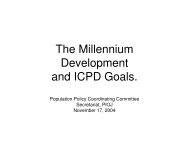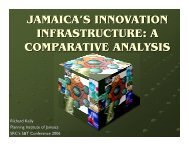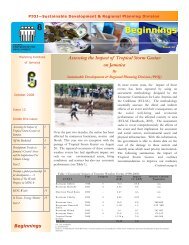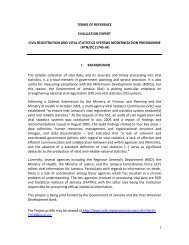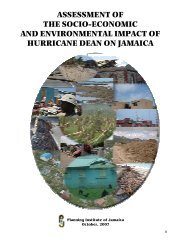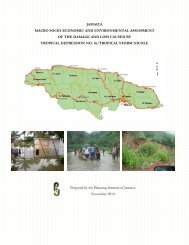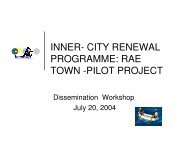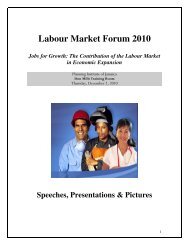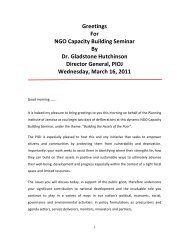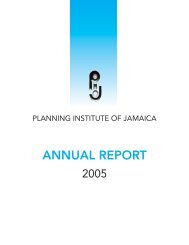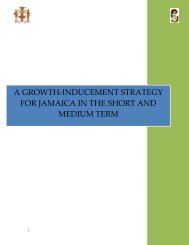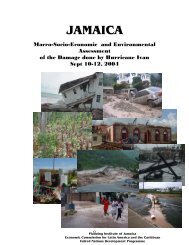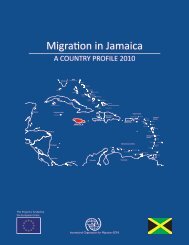Vital Statistics Commission of Jamaica - Planning Institute of Jamaica
Vital Statistics Commission of Jamaica - Planning Institute of Jamaica
Vital Statistics Commission of Jamaica - Planning Institute of Jamaica
Create successful ePaper yourself
Turn your PDF publications into a flip-book with our unique Google optimized e-Paper software.
Audit <strong>of</strong> <strong>Vital</strong> Registration and <strong>Vital</strong> <strong>Statistics</strong> Systems: <strong>Jamaica</strong><br />
Recently an amendment to the Coroner’s Act was passed that addresses some problems in the<br />
information collection process. Specifically addressed is the time interval in which the police<br />
are required to report to the Coroner. The police must now provide notification <strong>of</strong> any<br />
sudden or suspicious death to the Coroner within 48 hours <strong>of</strong> discovery and a report <strong>of</strong> their<br />
investigation within 21 days <strong>of</strong> notification (or seek an extension). In addition, a medical<br />
practicioner contracted to do the post mortem is given 48 hours to provide a report to the<br />
Coroner. This should have the effect <strong>of</strong> increasing the timeliness <strong>of</strong> the reporting <strong>of</strong> the fact<br />
<strong>of</strong> death and even perhaps the cause <strong>of</strong> death to the Coroner. However, the new act does not<br />
address the timing <strong>of</strong> the filing <strong>of</strong> Form D by the Coroner with the RGD. The Coroner’s Act,<br />
section 10, paragraph 1 gives the Coroner absolute discretion as to when Form D will be sent.<br />
The Act (Sections 10 and 15) also states explicitly that Form D is to be sent by the coroner to<br />
RGD, but apparently, the standard practice is for the coroner to give Form D to a family<br />
member to take to the LDR ostensibly because Form D does not contain much <strong>of</strong> the<br />
information needed for registration <strong>of</strong> the death. The problem is that Form D is <strong>of</strong>ten not<br />
picked up by the family. It is <strong>of</strong>ten difficult to obtain cooperation from families for<br />
registration information because there is no penalty for non-compliance and there is no need<br />
to obtain a burial permit since registration is not required for a burial permit in these cases.<br />
Only if there is an estate in question or a will to be probated is the family inclined to ensure<br />
registration procedures are completed. To address this gap, RGD parish <strong>of</strong>ficers present<br />
frequently to the coroner’s <strong>of</strong>fice to obtain all Form Ds not picked up by family members,<br />
but there is no written policy, formal expectation, or established frequency for these visits.<br />
Form D is manually logged at the coroner’s <strong>of</strong>fice in a paper logbook. There is no<br />
reconciliation to registrations reported by the RGD and the coroner’s <strong>of</strong>fice does not keep<br />
copies <strong>of</strong> Form D once they are sent to RGD. The coroners with whom we spoke claim that<br />
approximately three to four Forms D are lost per month by (or in transit to) the RGD,<br />
although there was no way for us to verify this claim. The current tracking and reporting<br />
system provides aggregate volume numbers only, and does not include the circumstances<br />
surrounding the causes, locations, etc. <strong>of</strong> deaths. If a juried inquest is held, the results are<br />
reported using Form E, Coroner’s Certificate <strong>of</strong> Finding <strong>of</strong> Jury, which is routed by the<br />
coroner to the RGD, but again, there is no tracking <strong>of</strong> delivery or reconciliation with RGD<br />
records. Form E would have the final determination as to the manner <strong>of</strong> death.<br />
There is some confusion as to whether RGD is allowed to make corrections to the<br />
information provided on Forms D and E if this information is found to be in error. We were<br />
told by one staff member at RGD that they could not make changes to the form and indeed,<br />
the coroners we talked to indicated that sometimes RGD would send a family member back<br />
to the coroner’s <strong>of</strong>fice with the form to effect changes. Another RGD staff member,<br />
however, indicated that changes could be made to the form by RGD staff. The Coroner’s<br />
Act, Section 28 states that the coroner can authorize the RGD to correct errors <strong>of</strong> fact,<br />
although these must be made in the margins <strong>of</strong> the Form. It is unclear whether the Act<br />
requires this authorization to be given in writing or whether such authorization could be<br />
given verbally.<br />
Statistical information on criminal acts, including violent deaths, is also gathered by the<br />
statistics divisions <strong>of</strong> district police departments. On a daily basis statistics are FAXed to the<br />
8



